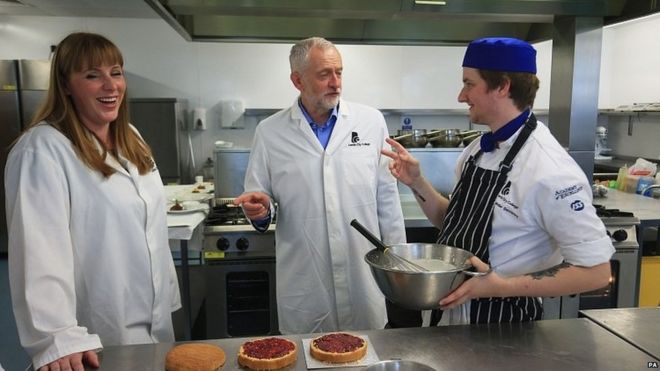
Labour has pledged to invest more than £20bn in schools in England by 2022 by significantly raising business taxes.
It said it would protect real-terms schools funding and cut class sizes for five, six and seven-year olds by hiking corporation tax from 19% to 26%.
The Lib Dems will spend £7bn over the same period to protect cash per pupil, funded by a smaller rise in the tax.
Theresa May said spending was at record levels and 1.8 million more children were in a good or outstanding school.
The prime minister also defended proposed changes to the national funding formula for schools in England, which have caused concerns among some Tory candidates, saying everyone agreed that the existing mechanism was “unfair” and needed reform.
Speculation has also been growing over Labour’s policy on university tuition fees after footage emerged of shadow chancellor John McDonnell saying last month his party would scrap them.
The BBC’s deputy political editor John Pienaar says he understands the party’s manifesto will take the party closer towards promising free tuition, though the details of the plan, and Labour’s proposals for meeting the cost, have yet to emerge.
He says abolishing tuition fees in higher education would be an expensive commitment – on one estimate costing £11bn.
Launching their plans for a “national education service”, Labour said they were committed to protecting core schools budgets through a £4.8bn annual real-terms funding increase.
They would also ensure no schools ended up with less cash as a result of the planned national funding shake-up by making available £335m of extra money a year for those affected.
BBC education editor Branwen Jeffreys says schools in England have been experiencing a financial squeeze for the first time in 20 years.
Head teachers have been warning about job losses caused by cash shortages, with the National Audit Office estimating schools will have to cut £3bn from budgets by 2019-20 to meet rising cost pressures.
Labour’s other proposals include:
- £1.9bn for skills and free “lifelong education”
- £582m to restore the Educational Maintenance Allowance
- Free school meals for primary schools
- £1.8bn on bringing back student maintenance grants
Shadow education secretary Angela Rayner told BBC Breakfast the Conservatives had “broken their contract” with the public over funding and grammar school expansion, to the point that some schools were having to let teachers and teaching assistants go.
“I want to reassure parents up and down the country that my priority is that our education system will be fully funded,” she said.
“Not only will schools have the money they need to ensure every child reaches their full potential but adult education will be free at the point of use so people can go back into education.”
She said this “transformative” change would mean anyone who wanted to re-train, for example, as a nurse would be able to do so.
The Institute for Fiscal Studies has calculated that Labour’s combined pledges so far amount to £8.4bn in extra spending a year by 2022, compared with that envisaged by the Conservatives.
The think tank has calculated that raising corporation tax to 26% – which would return the headline rate to its 2011 level – could raise at least £19bn a year in the short term but that the yields could reduce over time as the move could affect business investment.
The Lib Dems claimed their own plans went further than Labour’s and were more financially credible.
Leader Tim Farron said his party would raise corporation tax to 20% and abolish the married couples tax allowance, which has been in force since 2015. The rest of the funding would come from the £100bn in revenue he said the UK would hold onto by opting to stay in the EU’s internal market.
Pressed on how he could guarantee this given the Tories want to leave the single market and the Lib Dems have ruled out a post-election coalition with Labour, he told BBC Radio 4’s Today that “setting out your priorities is incredibly important”.
“It is desperately needed… We are going to see over the next three years £3bn taken out of schools. Two thirds of schools in Britain will be sacking at least one teacher before the start of the academic year and that is because the Conservatives have chosen priorities which are wrong.”
The Conservatives said Labour had already set aside the proceeds of the corporation tax rise to other projects and were also going back on a commitment not to increase the rate for small business – now mooted to go up to 21% by 2020-21.
Speaking in Nottinghamshire, Mrs May said the Conservatives were making their own funding guarantees – such as protecting the £2.5bn pupil premium for disadvantaged families – but that it wasn’t simply a question of extra resources.
“It is about the results you see and the education you are providing for the children,” she said. “We want to ensure every child gets a good start in life and that is why what we are proposing is a good school place for every single child.”
The Green Party of England and Wales warned against “pumping more money into a broken system”.
“We would bring free schools and academies back under the control of local authorities so they can be held to account and get rid of the relentless and counter-productive testing of teachers and pupils,” its spokeswoman Vix Lowthion said.
As education is a devolved matter, the pledges relate to England only, and the amount Scotland, Wales and Northern Ireland receives would be determined by their funding formula.
[Source:- BBC]





